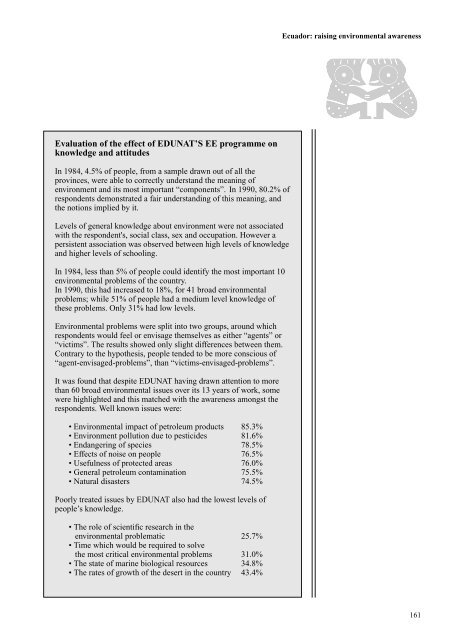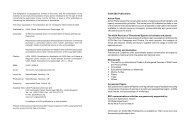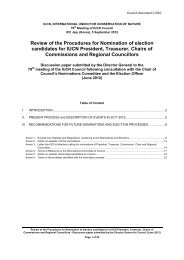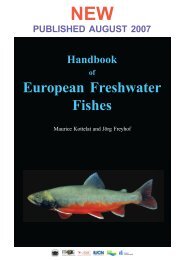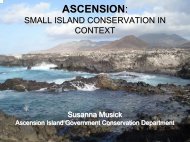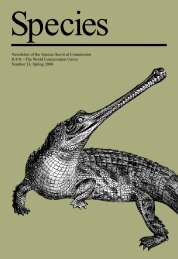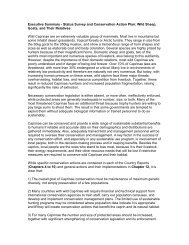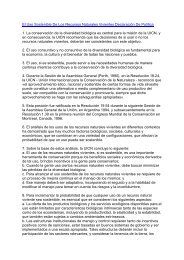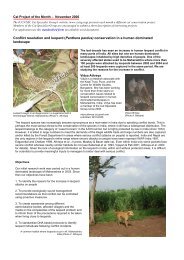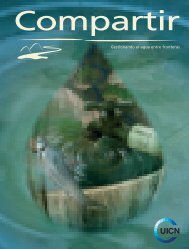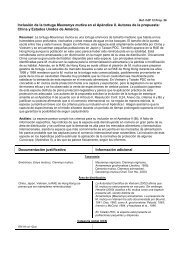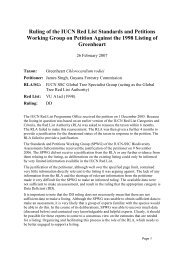Planning education to care for the earth - IUCN Knowledge Network
Planning education to care for the earth - IUCN Knowledge Network
Planning education to care for the earth - IUCN Knowledge Network
Create successful ePaper yourself
Turn your PDF publications into a flip-book with our unique Google optimized e-Paper software.
Ecuador: raising environmental awarenessEvaluation of <strong>the</strong> effect of EDUNAT’S EE programme onknowledge and attitudesIn 1984, 4.5% of people, from a sample drawn out of all <strong>the</strong>provinces, were able <strong>to</strong> correctly understand <strong>the</strong> meaning ofenvironment and its most important “components”. In 1990, 80.2% ofrespondents demonstrated a fair understanding of this meaning, and<strong>the</strong> notions implied by it.Levels of general knowledge about environment were not associatedwith <strong>the</strong> respondent's, social class, sex and occupation. However apersistent association was observed between high levels of knowledgeand higher levels of schooling.In 1984, less than 5% of people could identify <strong>the</strong> most important 10environmental problems of <strong>the</strong> country.In 1990, this had increased <strong>to</strong> 18%, <strong>for</strong> 41 broad environmentalproblems; while 51% of people had a medium level knowledge of<strong>the</strong>se problems. Only 31% had low levels.Environmental problems were split in<strong>to</strong> two groups, around whichrespondents would feel or envisage <strong>the</strong>mselves as ei<strong>the</strong>r “agents” or“victims”. The results showed only slight differences between <strong>the</strong>m.Contrary <strong>to</strong> <strong>the</strong> hypo<strong>the</strong>sis, people tended <strong>to</strong> be more conscious of“agent-envisaged-problems”, than “victims-envisaged-problems”.It was found that despite EDUNAT having drawn attention <strong>to</strong> morethan 60 broad environmental issues over its 13 years of work, somewere highlighted and this matched with <strong>the</strong> awareness amongst <strong>the</strong>respondents. Well known issues were:• Environmental impact of petroleum products 85.3%• Environment pollution due <strong>to</strong> pesticides 81.6%• Endangering of species 78.5%• Effects of noise on people 76.5%• Usefulness of protected areas 76.0%• General petroleum contamination 75.5%• Natural disasters 74.5%Poorly treated issues by EDUNAT also had <strong>the</strong> lowest levels ofpeople’s knowledge.• The role of scientific research in <strong>the</strong>environmental problematic 25.7%• Time which would be required <strong>to</strong> solve<strong>the</strong> most critical environmental problems 31.0%• The state of marine biological resources 34.8%• The rates of growth of <strong>the</strong> desert in <strong>the</strong> country 43.4%161


